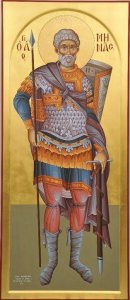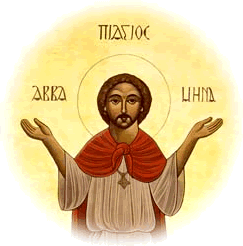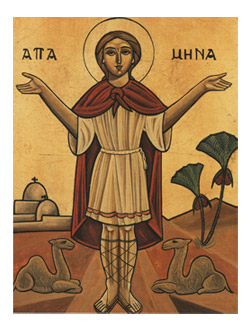- Aug 27, 2014
- 13,897
- 14,169
- Country
- United States
- Gender
- Male
- Faith
- Oriental Orthodox
- Marital Status
- Private
So today, June 7/Pashons 13, is the commemoration of one St. Fournous, one of the seventy disciples of Christ, according to the synaxarium of the Coptic Orthodox Church. His entry there is very brief and vague.
On this day also, the disciple Phorus (Fournous), one of the seventy disciples, departed. He served Christ for 3 years. After the ascension of the Lord, he served the apostles, and was filled with the Holy Spirit, the comforter on the day of Pentecost. Then he served St. Paul, and carried his epistles to many countries, and taught the Jews and pagans and baptized them. He suffered many afflictions, and departed in peace.
May his prayers be with us, and glory be to God forever. Amen.
After reading this, I tried my best to look him up on any one of the several lists shown on Wikipedia, but had no luck. It took a good ten minutes of staring at it and looking up individual stories to realize that the figure I am actually looking for who is commemorated today is none other than Saint Onesiphorus, bishop of Cyrene! You might say "Duh, Jeremy...it's right there in the name -- Phorus, Onesiphorus", but it's not so obvious when you have a Church whose saint's names have mutated over the last 2,000 years through three languages (sometimes more, if the saint is ethnically Syrian or Latin/Western), along the way either gaining or losing letters, having weird substitutions or deletions that aren't really necessary according to any of the rules of the languages involved (e.g., why do we call HH St. Anba Mikhail, the fifty-sixth Pope of Alexandria, "St. Anba Khail"? There's nothing in Arabic or Coptic that prevents a word from starting with "Mi", and Mikhail is already a name in Arabic! All they do is add a glottal stop in there -- Mikha'il, the same as they do with names like Israel/Isra'il, Ismael/Isma'il, etc.), etc. Also, the example of Onesiphorus is a pretty big loss that may make sense according to both Arabic and Coptic (in Arabic, words cannot begin with vowels, while in Coptic, words are 'left-branching', meaning that they are formed by the addition of prefixes onto a root noun on the right, so it would make sense to keep "Phorus" rather than another part of the word, though that is not consistent, thanks to the subsequent intervention of Arabic, e.g., St. Onuphrius is not St. Phrius, but St. Abu Nofer...arghhhhhhhhhh), but is extreme enough to probably qualify as the biggest single phonetic change of any saint's name that I can think of off the top of my head, in the sense of it losing the most individual sound segments in 'translation', if that's what you call this.
So yeah, sometimes looking up saints using the Synaxarium or another Coptic resource is keyboard-bashingly frustrating. It certainly doesn't help that they add a random "n" into the name Phorus in Arabic (isn't "Fournous" the Greek word for "ovens"? St. Ovens...yeah, that makes sense...let's go with that; good job, Team Random Letters!)

(Pictured: me trying to look anything up without having to call a priest for help)
I've even heard of Coptic people asking who "St. Abu Ghalimses" is, thanks to the Copto-Arabic rendering of "Apocalypsis" (as in Apocalypse Night/Bright Saturday of Holy Week, when we read aloud the Book of the Revelation of St. John; something of a Coptic peculiarity, I gather) as "Abu Ghalimses". That's gibberish in Arabic, as far as I can tell, but this stuff is so garbled at some points I don't blame them for asking. We have St. Abu Nofer (St. Onuphrius, as already mentioned), St. Abu Seifein (St. Philopateer Mercurius, though this one makes sense if you know the story behind it; he is "father/possessor/holder of two swords"), St. Abu Colta (St. Colluthus of Antinoe), so why not St. Abu Ghalimses? The fact that it doesn't mean anything didn't stop the Arabs at any other point, so once the Copts were sufficiently Arabized, why not? To this day, you can still find Muslims with Coptic last names that mean absolutely nothing in Arabic (e.g., famous poet/lyricist Abdel Rahman El Abnoudi; Abnoudi is from the Coptic Efnouti, which means "God"), so it's not all that shocking that the same is true the other way around. Just irritating when you're looking for information and then have to start thinking "Okay, the Coptic would've probably been this, but then Arabic came in and the correspondence between Coptic and Arabic would've made it more like this, and then...oh, wait a minute...they just decided to lop off half the name. Oh, okay. Cool."
So...yeah...what are your "tradition(al) pet peeves", if you have any?
On this day also, the disciple Phorus (Fournous), one of the seventy disciples, departed. He served Christ for 3 years. After the ascension of the Lord, he served the apostles, and was filled with the Holy Spirit, the comforter on the day of Pentecost. Then he served St. Paul, and carried his epistles to many countries, and taught the Jews and pagans and baptized them. He suffered many afflictions, and departed in peace.
May his prayers be with us, and glory be to God forever. Amen.
After reading this, I tried my best to look him up on any one of the several lists shown on Wikipedia, but had no luck. It took a good ten minutes of staring at it and looking up individual stories to realize that the figure I am actually looking for who is commemorated today is none other than Saint Onesiphorus, bishop of Cyrene! You might say "Duh, Jeremy...it's right there in the name -- Phorus, Onesiphorus", but it's not so obvious when you have a Church whose saint's names have mutated over the last 2,000 years through three languages (sometimes more, if the saint is ethnically Syrian or Latin/Western), along the way either gaining or losing letters, having weird substitutions or deletions that aren't really necessary according to any of the rules of the languages involved (e.g., why do we call HH St. Anba Mikhail, the fifty-sixth Pope of Alexandria, "St. Anba Khail"? There's nothing in Arabic or Coptic that prevents a word from starting with "Mi", and Mikhail is already a name in Arabic! All they do is add a glottal stop in there -- Mikha'il, the same as they do with names like Israel/Isra'il, Ismael/Isma'il, etc.), etc. Also, the example of Onesiphorus is a pretty big loss that may make sense according to both Arabic and Coptic (in Arabic, words cannot begin with vowels, while in Coptic, words are 'left-branching', meaning that they are formed by the addition of prefixes onto a root noun on the right, so it would make sense to keep "Phorus" rather than another part of the word, though that is not consistent, thanks to the subsequent intervention of Arabic, e.g., St. Onuphrius is not St. Phrius, but St. Abu Nofer...arghhhhhhhhhh), but is extreme enough to probably qualify as the biggest single phonetic change of any saint's name that I can think of off the top of my head, in the sense of it losing the most individual sound segments in 'translation', if that's what you call this.
So yeah, sometimes looking up saints using the Synaxarium or another Coptic resource is keyboard-bashingly frustrating. It certainly doesn't help that they add a random "n" into the name Phorus in Arabic (isn't "Fournous" the Greek word for "ovens"? St. Ovens...yeah, that makes sense...let's go with that; good job, Team Random Letters!)

(Pictured: me trying to look anything up without having to call a priest for help)
I've even heard of Coptic people asking who "St. Abu Ghalimses" is, thanks to the Copto-Arabic rendering of "Apocalypsis" (as in Apocalypse Night/Bright Saturday of Holy Week, when we read aloud the Book of the Revelation of St. John; something of a Coptic peculiarity, I gather) as "Abu Ghalimses". That's gibberish in Arabic, as far as I can tell, but this stuff is so garbled at some points I don't blame them for asking. We have St. Abu Nofer (St. Onuphrius, as already mentioned), St. Abu Seifein (St. Philopateer Mercurius, though this one makes sense if you know the story behind it; he is "father/possessor/holder of two swords"), St. Abu Colta (St. Colluthus of Antinoe), so why not St. Abu Ghalimses? The fact that it doesn't mean anything didn't stop the Arabs at any other point, so once the Copts were sufficiently Arabized, why not? To this day, you can still find Muslims with Coptic last names that mean absolutely nothing in Arabic (e.g., famous poet/lyricist Abdel Rahman El Abnoudi; Abnoudi is from the Coptic Efnouti, which means "God"), so it's not all that shocking that the same is true the other way around. Just irritating when you're looking for information and then have to start thinking "Okay, the Coptic would've probably been this, but then Arabic came in and the correspondence between Coptic and Arabic would've made it more like this, and then...oh, wait a minute...they just decided to lop off half the name. Oh, okay. Cool."

So...yeah...what are your "tradition(al) pet peeves", if you have any?
Last edited:




